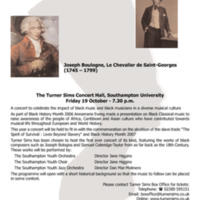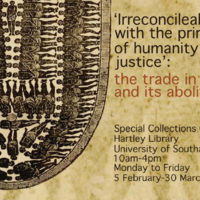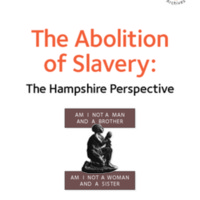
Spirit of Survival: Lives Beyond Slavery
A collaborative project to explore the links between Southampton and the slave trade led by Southampton City Council, the University of Southampton and The Confederation of African Caribbean Communities. One highlight of the programme was a concert at the Turner Sims Concert Hall at the University of Southampton to celebrate the impact of black music and black musicians. The concert, part of Black History Month 2007, featured the works of black composers such as Joseph Bologna and Samuel Coleridge-Taylor, performed by the Southampton Youth Orchestra, Southampton Youth Choir and the Southampton Youth Jazz Orchestra.

'Irreconcilable with the principles of justice and humanity': the trade in slaves and its abolition
An exhibition held in the Special Collections Gallery at the Hartley Library, University of Southampton. The exhibition took a broad view of the subject of transatlantic slavery across the 18th and 19th centuries, featuring accounts of the horrors of the transatlantic slave trade, the case for abolition, and contemporary tracts and pamphlets putting forward the arguments for total abolition. Alongside these were discussions of the place of slavery in the economy of the West Indies, and the detail of measures taken by governments, such as that of the first Duke of Wellington in 1828-30, and the work of the third Viscount Palmerston, as Foreign Secretary and Prime Minister. The exhibition also looked at the efforts of the Royal Navy to enforce legislation and treaties against slave trading.

The Abolition of Slavery: The Hampshire Perspective
A touring exhibition exploring Hampshire's links with slave ownership and the abolition campaign was produced by (and featured material from) Hampshire Museums and Archives Service and Hampshire Record Office. The exhibition was on show in the Record Office foyer, before travelling to museums, schools and community centres around the county. The exhibition revealed that there were slave owners living in places in Hampshire such as the village of Hurstbourne Tarrant, and told the story of a slave-trading voyage in 1700 led and financed by men from the Titchfield area. Black servants, very likely former slaves, could be found in unlikely places such as Martyr Worthy and Bramdean. The abolition campaign was fought in the columns of the Hampshire Chronicle and the Hampshire Telegraph, and communities as diverse as Portsmouth, Whitchurch and Fordingbridge sent in petitions to Parliament on the subject. The exhibition also mentioned white slaves taken from the English coast by Barbary pirates, and the testimony of a group of emancipated slaves from Cuba who arrived in Southampton in 1855 on their way to Lucomi in Africa.